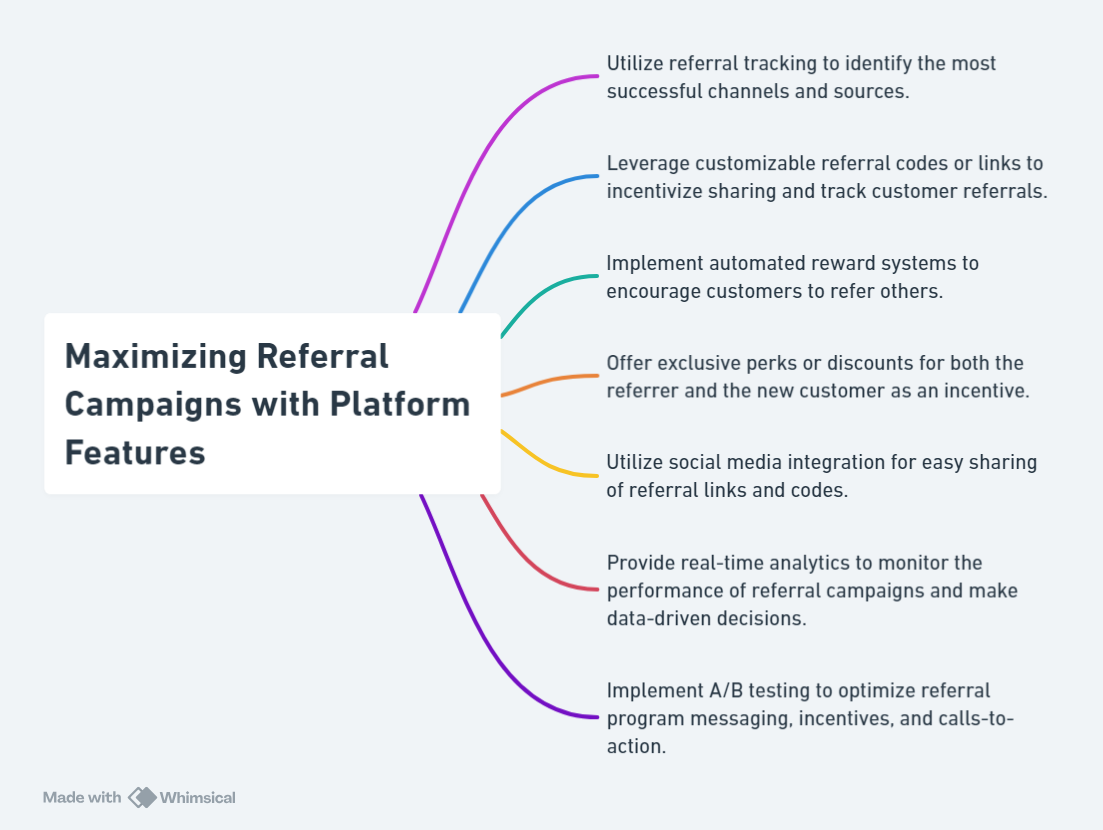Referral marketing is a powerful strategy for businesses to acquire new customers and grow their revenue. By leveraging the trust and credibility of existing customers, businesses can generate high-quality leads and conversions. However, choosing the right referral marketing platform is crucial to the success of any referral program. In this comprehensive guide, we will explore the key factors to consider when selecting a platform, discuss best practices for maximizing referral campaigns, and provide case studies of successful referral programs.
Choosing the Right Referral Marketing Platform

1. Introduction: In the realm of referral marketing, selecting the right platform is paramount. A robust referral marketing platform serves as the foundation for your campaign’s success, offering the tools and features necessary to effectively manage and track referrals.
2. Understanding the Importance: Before delving into the selection process, it’s crucial to grasp the significance of a referral marketing platform. Such platforms streamline the referral process, automate tracking and reward distribution, and provide valuable insights into campaign performance.
3. Key Considerations: When evaluating referral marketing platforms, several factors merit consideration. Firstly, assess the platform’s compatibility with your business model and objectives. Look for features such as customizable referral workflows, seamless integration with existing systems, and scalability to accommodate growth.
4. Features to Look For: A comprehensive referral marketing platform should encompass a range of essential features. Look for robust tracking capabilities to monitor referral activity in real-time. Additionally, seek platforms that offer customizable referral program templates, personalized referral links, and automated reward fulfillment.
5. Integration Capabilities: Seamless integration with your existing tech stack is essential for maximizing efficiency and minimizing disruptions. Choose a referral marketing platform that integrates seamlessly with popular CRM systems, e-commerce platforms, and email marketing tools.
6. User Experience: The usability and intuitiveness of the platform are paramount to user adoption and engagement. Opt for a referral marketing platform with a user-friendly interface, comprehensive onboarding resources, and responsive customer support.
7. Budget Considerations: While cost shouldn’t be the sole determining factor, it’s essential to assess the pricing structure of potential platforms. Consider factors such as setup fees, subscription plans, and any additional charges for premium features or support.
8. Reputation and Reliability: Research the reputation and track record of prospective referral marketing platforms. Look for platforms with a proven history of reliability, security, and customer satisfaction. Reading reviews and seeking recommendations from industry peers can provide valuable insights.
9. Trial and Demo Opportunities: Before making a final decision, take advantage of trial periods or demo opportunities offered by referral marketing platforms. This hands-on experience allows you to evaluate the platform’s functionality, user experience, and compatibility with your specific needs.
10. Conclusion: In conclusion, choosing the right referral marketing platform is a critical decision that can significantly impact the success of your referral campaigns. By considering key factors such as features, integration capabilities, user experience, and budget, you can make an informed choice that aligns with your business goals and objectives.
The Ultimate Referral Marketing Plan: A Step-by-Step Guide
Maximizing Referral Campaigns with Platform Features

Once you have chosen a referral marketing platform, you can start maximizing your referral campaigns by leveraging its features. Here are some best practices:
- Set clear goals and objectives: Define the specific outcomes you want to achieve with your referral program, such as increasing customer acquisition or generating leads. This will help you tailor your referral campaign and measure its success.
- Create compelling referral incentives: Offer rewards that are valuable and relevant to your target audience to encourage referrals. Consider offering discounts, free products or services, or other incentives that will motivate your customers to refer their friends and family.
- Promote your referral program: Use a variety of channels to promote your referral program, such as email, social media, and your website. Create eye-catching promotional materials and use clear and concise language to explain the benefits of your program.
- Automate referral processes: Use the platform’s automation features to streamline referral tracking, reward distribution, and follow-up communications. This will save you time and effort, and ensure that all referrals are handled promptly and efficiently.
- Personalize the referral experience: Use the platform’s customization features to create a personalized referral experience for your customers. This could include using their name and contact information in referral emails or offering tailored rewards based on their preferences.
By leveraging the features of your referral marketing platform, you can create a successful referral campaign that generates high-quality leads and drives revenue growth.
Boost Your Brand: Referral Marketing Agencies Strategies in 2024
Tracking and Measuring Referral Success
![]()
Tracking and measuring the success of your referral program is essential for continuous improvement. Here are some key metrics to track:
1. Number of referrals: The total number of referrals generated by your referral marketing platform. This metric gives you an overview of the overall performance of your program.
2. Conversion rate: The percentage of referrals that convert into new customers or leads. This metric tells you how effective your referral program is at generating qualified leads.
3. Customer lifetime value: The average revenue generated from each referred customer over their lifetime. This metric helps you understand the long-term value of your referral program.
4. Return on investment (ROI): The ratio of revenue generated from referrals to the cost of implementing and running the referral marketing platform. This metric shows you the financial return on your investment in referral marketing.
By tracking these key metrics, you can identify areas for improvement and optimize your referral program for maximum success.
In addition to these core metrics, you may also want to track other metrics that are specific to your business and goals. For example, you could track the number of referrals generated by different channels, or the average time it takes for referrals to convert into customers.
Referral Network Marketing: Beyond the Basics in 2024
Case Studies of Successful Referral Programs

Referral marketing platforms have revolutionized the way businesses acquire new customers and generate leads. Through the implementation of innovative referral programs, businesses across various industries have achieved remarkable success. Let’s delve into some compelling case studies that highlight the effectiveness of referral marketing platforms.
1. Case Study 1: Company A’s Rapid Growth Company A, a software-as-a-service (SaaS) startup, leveraged a referral marketing platform to fuel its growth. By incentivizing existing customers to refer friends and colleagues, Company A witnessed a surge in qualified leads. The referral marketing platform enabled seamless tracking of referrals, ensuring accurate attribution and reward distribution. Within months, Company A experienced a significant increase in customer acquisition and achieved impressive revenue growth.
2. Case Study 2: E-commerce Success Story An e-commerce retailer, Company B, implemented a referral marketing platform to expand its customer base and boost sales. Through strategic referral incentives and personalized referral links, Company B encouraged satisfied customers to spread the word about its products. The referral marketing platform provided valuable insights into customer behavior and referral performance, allowing Company B to refine its referral strategies continuously. As a result, Company B experienced a substantial increase in website traffic, conversion rates, and revenue.
3. Case Study 3: Service Industry Triumph Company C, a leading provider of home services, transformed its customer acquisition efforts with a referral marketing platform. By offering incentives to both referrers and referees, Company C incentivized word-of-mouth marketing and rewarded loyal customers. The referral marketing platform facilitated seamless referral tracking and management, enabling Company C to monitor the effectiveness of its referral campaigns in real time. Through the implementation of targeted referral strategies, Company C achieved a notable increase in customer referrals and witnessed a surge in service bookings.
Boost Your Sales: Referral marketing E-commerce Strategies
Conclusion on the referral marketing platform

